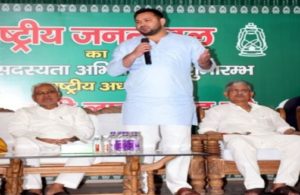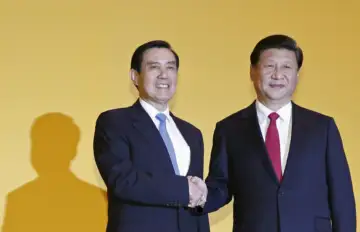
The ruling party of Taiwan Democratic Progressive Party (DPP) lashed out at the opposition party the Kuomintang (KMT) for sending its deputy chief on a China trip amid tensions between both nations.
The DPP said that the trip will create internal division in the country as it is facing a threat to its sovereignty from China.
Andrew Hsia, the vice-chairman of the KMT and a veteran diplomat who also served as Taiwan’s top China official said the trip was to extend support to Taiwanese people living in China.
Hsia told that there are no plans to meet Chinese officials. “It is, of course, possible that they will reach out or we might encounter them in the context of our meetings with Taiwanese businesses,” Hsia was quoted as saying by the Financial Times.
 Chinese President Xi Jinping shakes hands with Taiwan’s President Ma Ying-jeou during a summit in Singapore November 7, 2015. (Image: Reuters File)The nation’s China policy body issued a stark warning. “This move will cause domestic controversy and anxiety, high public misgivings and affect our internal unity. It will also confuse and mislead the international community’s perception of the threat Taiwan faces,” the body said, according to FT.
Chinese President Xi Jinping shakes hands with Taiwan’s President Ma Ying-jeou during a summit in Singapore November 7, 2015. (Image: Reuters File)The nation’s China policy body issued a stark warning. “This move will cause domestic controversy and anxiety, high public misgivings and affect our internal unity. It will also confuse and mislead the international community’s perception of the threat Taiwan faces,” the body said, according to FT.
Voters and the DPP suspect the KMT of being pro-China. A recent poll suggests that their approval rating amongst the Taiwanese has fallen to 17%. The KMT ahead of the trip were asked if their vice-chairman would condemn the war drills in response to US House Speaker Nancy Pelosi’s visit in the Taiwan Strait. The party said that it condemns China’s military drills without elaborating further.
The KMT ruled Taiwan for 50 years – starting in 1950 when Chinese president Mao Zedong defeated Chiang Kai-shek’s nationalists forcing the latter to flee to the island – and were defeated in 2000 in the elections.
They remained out of power for eight years and again returned to power in 2008. They remained in power for eight years once more until 2016 when current president Tsai Ing-Wen defeated Ma Ying-jeou, who batted for warmer relations with China unlike his successor.
KMT leaders Lien Chan and former president Chen Shui-bian met Chinese premier Hu Jintao earlier in 2005 and batted for warmer relations. Though the KMT says Taiwan is part of one China but says its interpretations is different from Beijing’s ‘one country, two systems’ approach.
The Chinese government also has tried to use the KMT to undermine Tsai-Ing Wen’s authority in Taiwan. Ahead of Hsia’s arrival, China published a white paper on its Taiwan policy reiterating its position that Taiwan is a part of China.
Beijing says the paper will strengthen the confidence of those who support Taiwan’s reunification with the motherland. This is the first time in three years that the deputy chief of the KMT is visiting China.
Hsia, according to Taiwanese media outlets will visit Fujian, Guangdong and the Yangtze River Delta and speak with the Taiwanese community and small businesses.
Hsia told the media that amid the tensions ‘communicating is better than not communicating at all’. He also said that there are no plans to visit Beijing.
Taiwan’s DPP told news outlet UDN that it is keeping an eye on the itinerary to check for any sudden changes since the itinerary was only revealed after Hsia left the country.
(with inputs from Financial Times)




 Driving Naari Programme launched in Chandigarh
Driving Naari Programme launched in Chandigarh






























